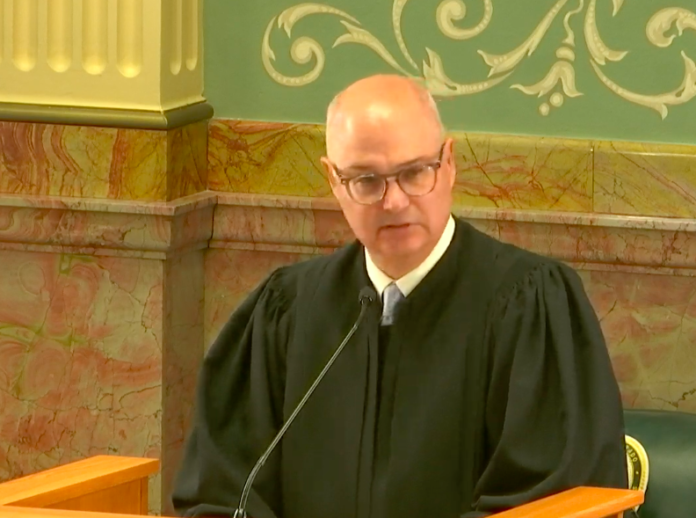
Colorado Supreme Court Chief Justice Brian Boatright delivered an emotional state of the judiciary address to lawmakers Friday.
During a joint session of the Colorado General Assembly on Jan. 13, Boatright discussed recent challenges and changes at the Colorado Judicial Branch which oversees Colorado’s 22 judicial districts across the state, appeals courts, State Court Administrator’s Office and more.
In 2022, the branch faced hiring and retention challenges, Boatright said. He added the branch plans to implement new workplace policies and highlighted the work of several Colorado probation officers over the past year.
“The last two years have not been easy. But it has also been a time where leadership has been presented with opportunity,” said Boatright. “Honestly, the difficulties have allowed us to really examine how we work and who we are. We are in a much better place than we were two years ago at this time. And because of the lessons we learned, I’m here to tell you our future is bright.”
The Colorado judicial branch is still in the shadow of a slew of accusations first published in 2021 alleging widespread workplace misconduct and cover ups by judges and judicial branch employees. The scandals have resulted in multiple investigations and proposed changes in judicial discipline proceedings in Colorado.
Both independent investigations commissioned by the judicial branch published findings last summer and determined the department could improve its work policies and reporting routes for misconduct. A survey of judicial branch employees found that women, who made up 75% of employees, were more likely than their male counterparts to report negative perceptions of their work environment around safe reporting, a healthy workplace and overall satisfaction.
Partially in response to the findings of investigators, Boatright said judicial branch leadership embarked on a state-wide tour last year from September to November to hear from some of the 4,000 employees and 300 judges employed by the judicial branch.
“Our goals were to listen to the concerns and issues that are important to our employees and judges, and hopefully convey that we sincerely care about each and every one of them,” said Boatright.
The top concern for judicial branch employees, he said, was compensation. Many workers said they work multiple jobs to make ends meet, including probation officers and judicial assistants.
Boatright added that for judicial departments in communities where cost of living is high, like the 9th Judicial District which is home to the Pitkin County Courthouse in Aspen, stagnant wages mean high turnover rates and vacancies. Over the past two years, Boatright said the Pitkin County Courthouse has had 40% of its jobs remain open largely due to compensation and cost of living gaps in the area.
“Suffice it to say that in many parts of the state, we’re simply not paying a livable wage. We’re losing good employees everyday to higher paying jobs,” said Boatright.
In its fiscal year 2023-24 budget request, the Colorado Judicial Branch said its current compensation for employees is around 15% below market rates and said in 2023, it plans to conduct a compensation and classification renovation project to update job descriptions and pay.
Boatright told lawmakers the branch will create a new department, the Office of People and Culture, to better support employees and implement written policies about professionalism, conduct and diversity, equity and inclusion.
He added that in recent years, Colorado courts have taken steps to increase diversity on the bench. Boatright told lawmakers public perceptions of fairness about courts increase when different races, genders and backgrounds are represented in a court’s judges. Multiple initiatives aimed at boosting diversity have led to more women and people of color being appointed to Colorado courts in recent years, Boatright said.
During his address, Boatright recounted the work of judicial branch employees and specifically probation officers in Colorado.
“We also found that employees all around the state are deeply committed to the work of the judicial branch. I could not be prouder of our employees. The branch survived some trying times during COVID,” said Boatright. “Our judicial officers, court executives, clerks of court, court staff and probation officers are frontline heroes in my eyes.”
Boatright told three stories about the work of Colorado probation officers in recent years. Two of the stories described how probation officers administered CPR and quickly alerted emergency responders to prevent two clients from dying after fentanyl overdoses. The third focused on a probation officer who worked with a client to help her get sober which eventually led the client to regaining custody of her son and starting a career counseling others in the probation system.
Boatright asked lawmakers to recognize the officers who sat in the public seats at the state Capitol.
“Probation is intended to rehabilitate an offender, reintegrate them in the community and provide tools to help them,” said Boatright. “In my 30-plus years working in the criminal justice system, I know our probation officers want their probation clients to succeed.”
Closing out the address, Boatright told lawmakers about the backgrounds of Colorado’s seven Supreme Court justices.
“I’m proud to serve with each one of them. While we frequently do disagree on the legal issues that come before us. We are one mind in our dedication to the branch. We are the leaders of the branch. And we are committed to our emerging future,” said Boatright.
“I am here today to say that we have a vision and a plan,” he said. “We’re improving our operations to better serve Colorado. We’re empowering our employees. And we’re listening to all our stakeholders. There remains work to be done. But we have a path forward to which we are committed to.”

